
This guide was written for French Beginners that don’t know where to start learning the French language.
Contents
French Language History
The Romance language of France was developed from Latin and adopted in France between the 6th and 9th centuries. It is one of the ‘Romance languages’, hence the name of this website, and are also referred to as Romanic languages, Latin languages or Neo-Latin languages
Why Learn the French Language?
You probably already have your own reasons on whether or not you want to begin learning French or not. You may have doubts or simply lack the necessary motivation to learn. Many people have various reasons for learning any language. So I humbly submit 5 reasons on why you should consider learning French as a second or possibly third language.
1. French is one of the world’s major international languages
The French language is spoken by over 200 million people in 43 countries, on five continents. French is one of the most widely taught second languages after English. French is also the official language of the International Red Cross and one of the official languages of the Olympic Games. French is one of the official languages of the United Nations. Knowing French increases your chances of communicating in a non-English-speaking country.
2. Knowing French will improve your vocabulary in English.
Approximately 45% of English vocabulary comes from French. As you learn French, you also enhance your grammar and vocabulary skills in English. Over 50,000 English words have their origin in French. Learning French can also increase your problem-solving skills and improve your memory, self-discipline, and self-esteem. Because progress is very easy to measure, you can quickly take pride in your new abilities. Knowing French can help you attain a number of important life skills and creative thinking skills.
3. French literature is one of the richest and most influential of the modern European world.
Featuring authors such as Rabelais, Montaigne, Racine, Proust, and Marguerite Duras. French-language authors from outside France such as Patrick Chamoiseau, Maryse Condé, and Tahar Ben Jelloun now have international followings. Several well-known philosophers were also French, including Descartes, Pascal, Rousseau, Voltaire, Sartre, and Simone de Beauvoir. These authors’ works are far more appreciated when read in the original language.The prestige of French art, music, dance, fashion, cuisine, and cinema makes French a culturally important foreign language. France is one of the most prolific producers of international films. When you understand French, you don’t have to rely on subtitles to enjoy a French film.
4. French can improve your travel around the world.
Using French enhances your travel opportunities abroad to the Caribbean, Europe, and Africa and beyond. After the United States, France is the second most visited tourist destination in the world. Paris was recently named by Fortune Magazine as one of the top ten global cities. When you speak French, you can be an educated tourist, ask for directions, get your own hotel room or tell a French friend about your own country.
5. Speaking French will increase your job opportunities and salary potential.
French is a major language of high-tech and business in the world. Knowledge of a second language is essential in over 60 occupations. Canada is officially bilingual and an international trading partner requires labelling in English and French on all imported products. More than 1,200 French companies have subsidiaries in the U.S., and France is one of the largest recipients of Canadian Foreign investment. France is a world leader in the development of modern telecommunications, a market with explosive growth potential.
French Beginners Guide
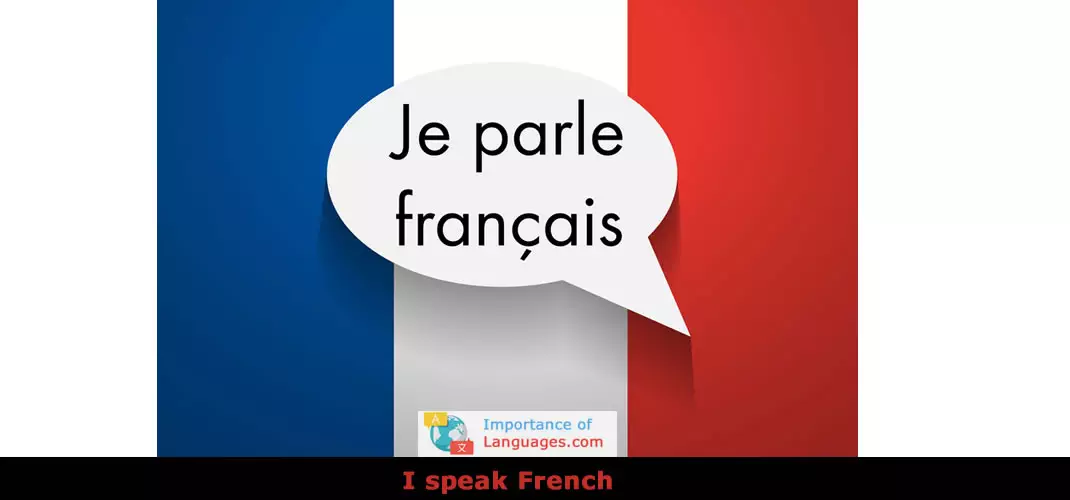
French Alphabet
Learning to read the French Alphabet should be the first stop for French beginners. You should be easily able to understand the French Alphabet because it has the exact same letters and style of writing as English.
Alphabet in French
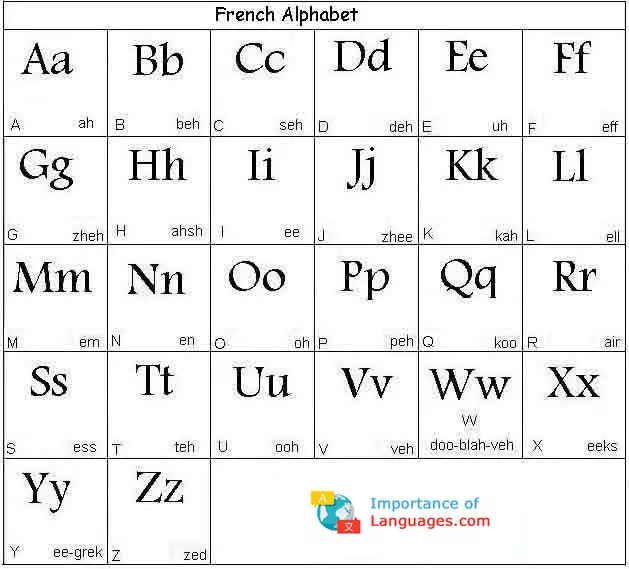
Where they differ though is in pronunciation. French Numbers are the same way.
French Numbers
Whatever second language you choose to study, one of the the first basic principles is to learn how to count. The first step is to learn the English-French translation of Cardinal numbers (that reflect a quantity) and then to learn the Ordinal numbers such as first, second or third (that reflect a position).
Ordinal and Cardinal French Numbers
Cardinal numbers like six and nine reflect a quantity such as two cats or nine rabbits – translated in French as ‘Deux chats’ and ‘Neuf lapins’. When learning to count you will see many similarities with words used in the English language such as ‘cani’ & ‘canine’. Numbers expressed as the sixth or the ninth are referred to as Ordinal numbers and translate as ‘Sixième’ for 6th and Neuvième for 9th.
In respect of the Ordinal, positioning numbers, they are expressed in a different format to English ordinal numbers. French ordinal numbers are expressed with a hyphen such as ‘Vingt-cinquième’, in the same format as for English ordinal numbers. There are distinctive words that are used for the first 10 ordinal numbers, and the remainder are formed from the cardinal number by adding “ième.”
French Numbers 1-10
[su_column size=”1/2″ center=”no” class=””]| French Vocabulary for Numbers | ||
| Zero | zéro | |
| One | un | |
| Two | deux | |
| Three | trois | |
| Four | quatre | |
| Five | cinq | |
| Six | six | |
| Seven | sept | |
| Eight | huit | |
| Nine | neuf | |
| Ten | dix | |
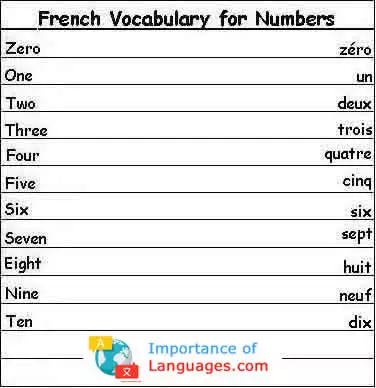
French Numbers 1-100
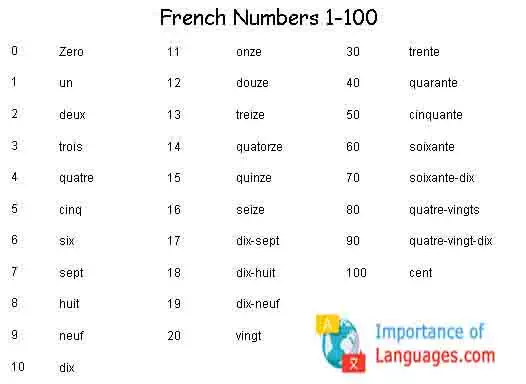
French Vocabulary
Logical next step for French beginners after learning the French Alphabet would be to start developing your French vocabulary with French words and phrases.
The French Language has close to 1 million words.
Popular French words in English
- café
- en route
- rendezvous
- carte blanche
- faux pas
- par excellence
- coup d’état
- Laissez faire
- pièce de resistance
- RSVP
- Omelette
- déjà vu
- pâté
- soufflé
- c’est la vie
French Dialect Map – French Language Countries
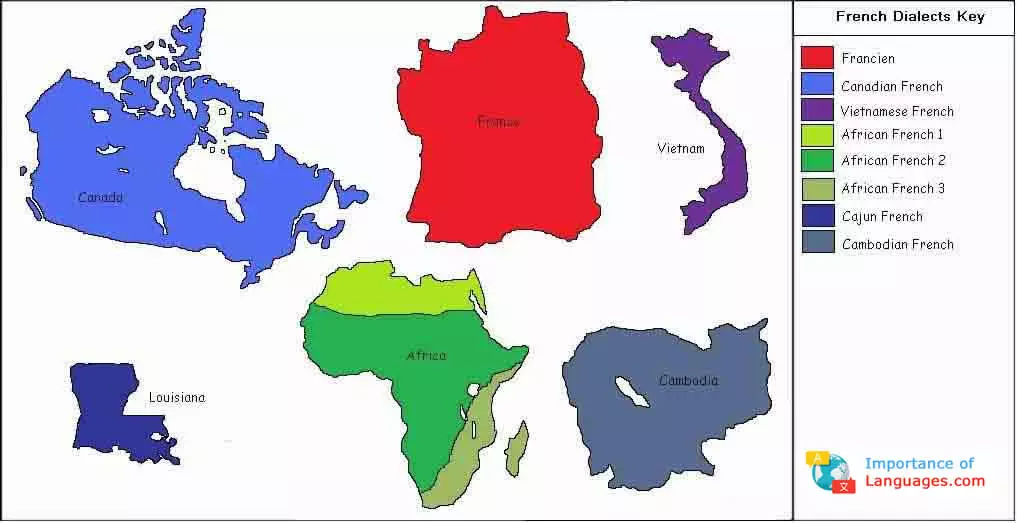
French Grammar Rules
The French grammar rules you must follow and understand to properly speak the French language.
- French sentence structure is pretty straightforward and follows a Subject-Verb-Object pattern.
- French nouns have genders: Masculine and Feminine which can greatly change the meaning of the word.
- French Verb Conjugation refers to the five possible inflexions of a verb: Person, Number, Mood, Tense, and Voice. French Adjectives usually follow the noun or pronoun they modify.
French Grammar Rules: Sentence Structure
French word order is similar to English with a Subject + Verb + Object format.
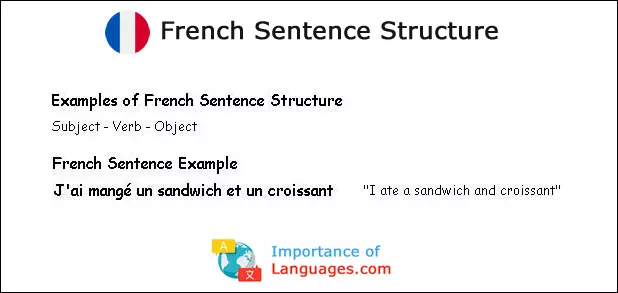
French Grammar Rules: Nouns and Pronouns
French Nouns have a Gender: Masculine and/or Feminine
• Gender of the Noun can change the meaning of the word.
• Some words are always feminine regardless of who they are referring to.
• A Hyphen is sometimes used at the beginning of a sentence when there is no link to the verb, or used between the verb and pronoun.
| French Masculine/Femimine | ||
| Masculine Suffix Exemples | Female Suffix Examples | |
| – age | -èe | -ure |
| – eau | -ion | -ence |
| – ment | -isme | -ance |
| – oir | -tè | -ette |
| – one | ||
| and much much more. | ||
| Familiarizing yourself with the various suffixes and preffixes is a very important part of learning nouns is understanding the different between Masculine and Femimine nouns. |

French Grammar Rules: Verbs
Each Mood as at least 2 tenses. Past and Present.
• Mood describes the speaker’s feeling towards the action of the verb.
• Indicative Mood is the most commonly used mood and has eight possible tenses.
• French Verb Conjugation refers to the five possible inflexions of a verb: Person, Number, Mood, Tense, and Voice.
French Grammar Rules: Adjectives•
French Adjectives usually follow the noun or pronoun they modify
• Adjectives usually follow the noun they describe. If the noun is plural, the adjective takes a plural form, and if the noun is feminine, we put the feminine form, usually by adding an e or by doubling the final consonant and adding e.
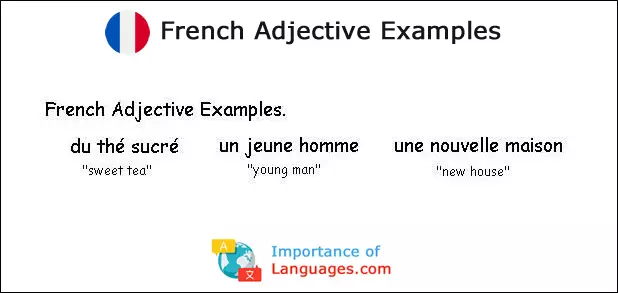
Learning French grammar rules can be considered the cornerstone of the language and will take some time to learn but creates a sturdy foundation to help you completely learn French in no time. Take the time to let these points soak in, then build on them as you continue your French studies. Good luck, and have fun learning French.
Common French Words
Your French vocabulary should begin with words you could use in your daily life and should be familiar with already. Below are some useful French vocabulary and expressions for Continents, Weather, Anatomy, Home/Rooms, Vehicles, and Countries from around the world.
Depending on where you live. You are taught a little differently when it comes to continents, if you’re an American like me, you were taught 7 continents. In parts of Europe, some are taught 5-6 continents instead. Either merging Europe and Asia as Eurasia and combining North and South America as one continent.
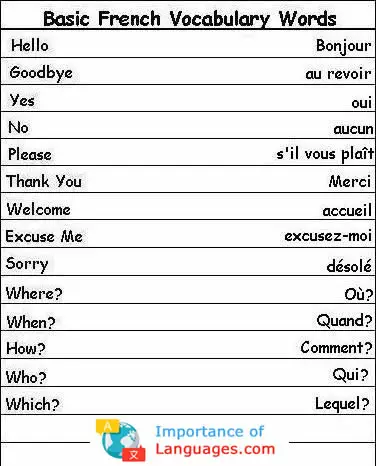
Consider an Online French Language Course
If you’re really serious about learning French and want to maximize your time then you should consider using an Arabic language course to further aid you in your quest to learn French. There are several great programs out there that deliver a great language learning experience.
The advantages of a language learning program are the organization and having a next step already lined up. Most break down the lessons into 30-minute intervals that can fit into any type of schedule. Flexible to retry a lesson to make sure you understand what you are learning and give you confidence in succeeding.
Try these French Language online courses:


GOOD NIGHT. I WANT TO LEARN ORDINARY NUMBER IN FRENCH WITH PRONOUNCE. PLEASE WRITE ME
i need to learn french